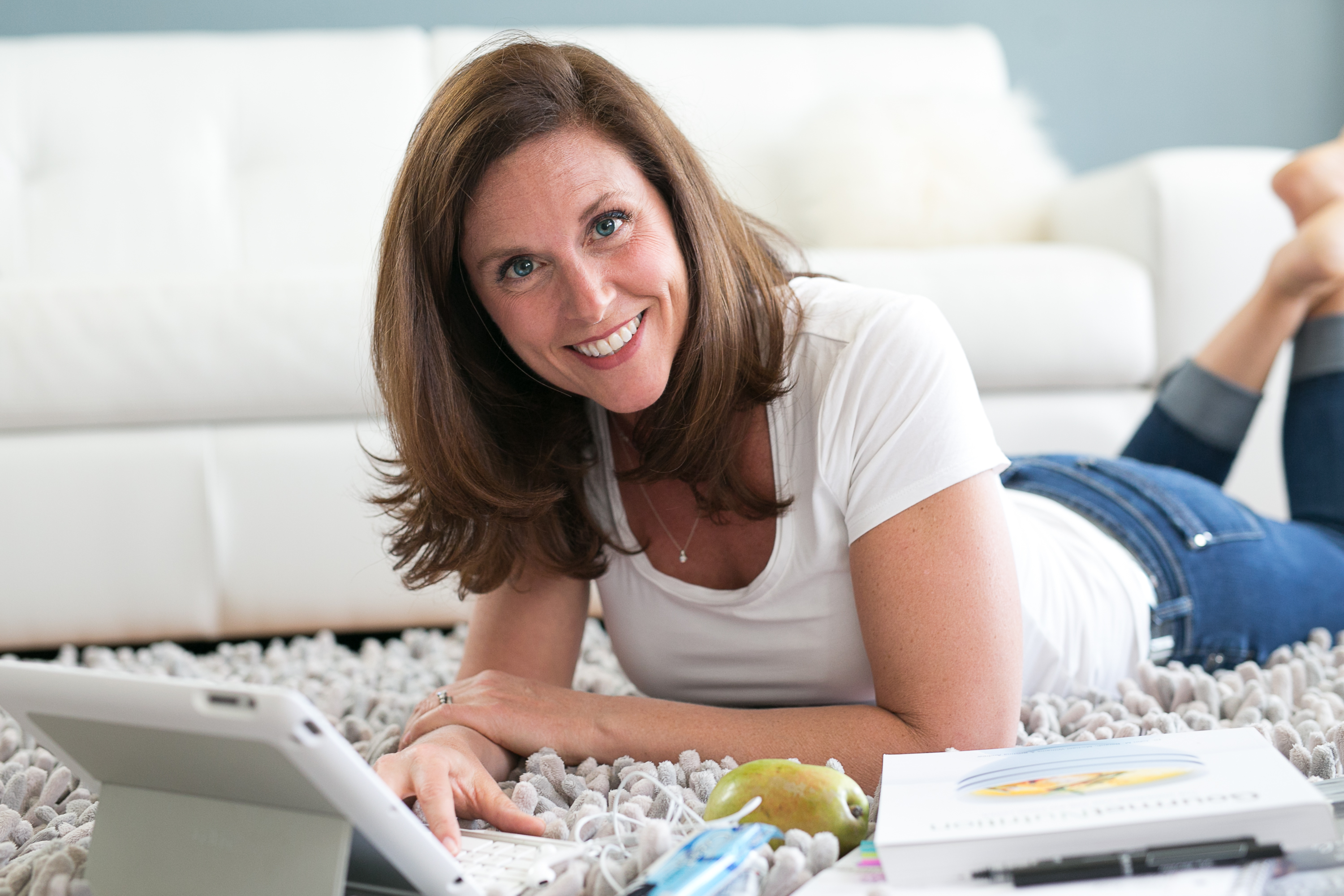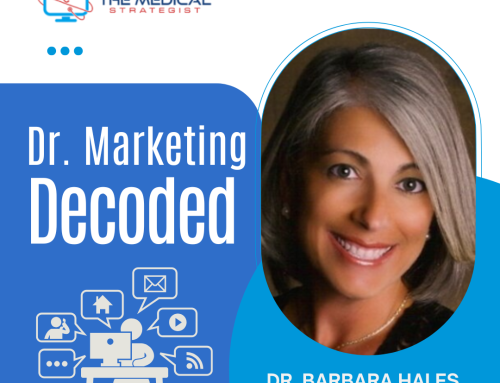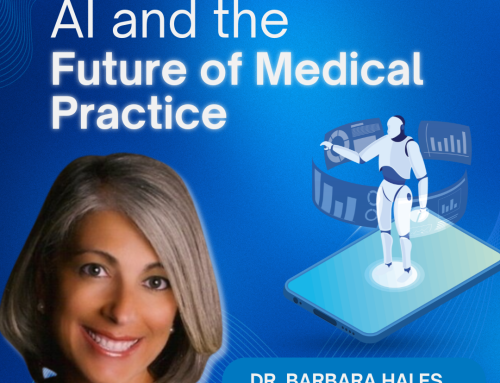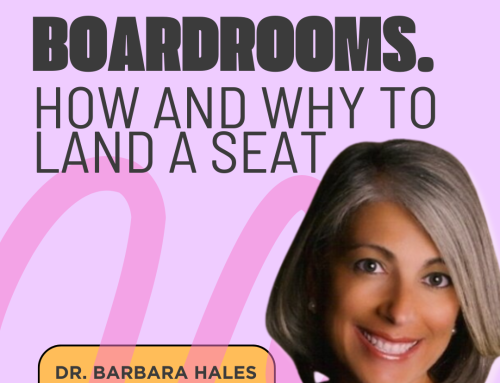Podcast: Play in new window | Download
Subscribe: RSS
In this episode, Barbara and Elizabeth discuss:
- Breaking the patterns of habitual or emotional eating and the well-worn paths to the kitchen.
- 3-Step plan for breaking the patterns.
- Checking in to your emotions and recognizing how it is affecting your body.
Key Takeaways:
- Being aware of our actions is half the battle to changing those habits.
- Plan your meals for the following day the night before – when we plan, we are using our prefrontal cortex to make decisions. In the moment, unplanned, we use the emotional part of the brain.
- Pay attention to the emotions that you are feeling – they are there for a reason.
- Self-care is for everyone, not just women.
“We are emotional beings and it is okay to feel this way right now.” — Elizabeth Sherman
Transcription
Barbara: Welcome to another great episode of Marketing Tips for Doctors. This is your host, Dr. Barbara Hales.
Today, we are fortunate to have Elizabeth Sherman. She is a life and weight loss coach who works with mostly women to lose weight and feel better through managing easy-to-do sustainable habits like diet, exercise, sleep and stress management.
Using certain cues including cravings, hunger, energy, stress and sleep, she helps folks design the right health program for their body and lifestyle and address the obstacles and barriers we encounter when trying to be consistent in our desired habits.
We can achieve optimal health which leads to better energy, focus, productivity, relationships and happiness in our lives. Elizabeth is a Chicago native but now lives in Puerto Morelos, Mexico. Due to the amazing advancements in technology, she meets with her clients online. She is a certified life coach, nutritionist, personal trainer and health coach. Welcome Elizabeth.
Elizabeth: Thank you. It’s awesome to be here. Thanks for having me.
Barbara: Well, you couldn’t have come at a better time because now that we are all in self-isolation and being sequestered, there is a well-worn path between wherever we are in the house and the refrigerator and back, and the kitchen cabinets and back. So, share with us how we could stop and break that because a lot of us with stress are eating out of boredom or due to high emotion level which we’re all on now. What is your advice about that?
Elizabeth: Right. I mean, this is something that I’m just getting bombarded with. All of my clients are like, oh my gosh, I have to work at home now and all of a sudden, I’m just finding myself in the kitchen staring aimlessly into the pantry or the cupboards looking for something to eat and I don’t know what to do. So yeah, you’re not alone if that’s something that you are doing. And you know, this is actually something that even though I’m a health coach, it’s actually a process that I went through as well.
I actually have a three-step plan for the listeners to, you know, do when they find themselves in this situation. And I think that the first thing is awareness. So being aware of what it is that we’re doing is going to be half the battle to conquering any situation. And so for me, I know that once I started paying attention to my hunger signals that that was a huge turning point for me. Because when we’re looking in the pantry or the refrigerator for something to eat, being aware of “am I actually hungry?” is a really good question to ask yourself. Is that something that you do?
Barbara: Unfortunately, when we’re doing that, it’s not even a question of hunger as you know. It’s a question — It seems to be like we turn into zombies and it’s this evil spirit that is like forcing us.
Elizabeth: This evil spirit is forcing me to eat. Okay, so then when you know that you’re not eating because of hunger, then you’re eating either out of habits or you’re eating out of emotion. Okay. So, let’s talk about the habit loop first. So oftentimes when we do something out of habit, we started doing it for one reason but we continue doing it for potentially another reason. But there’s always some sort of payoff whenever we establish a habit.
The habit loop is that you have a cue and then you have your routine that you do and then you have your reward. The cue might be, it could be an emotion. The cue could be I’m bored or I don’t want to do this proposal or I don’t want to work on this thing that I said that I was going to do. I’m going to distract myself and I’m going to see what’s interesting in the kitchen. And then that would be your routine, is walking to the kitchen, going to find something to drink or something to eat. And then your reward is, you know, the reward of eating and getting your dopamine hit. So, you need to figure out whether you are eating because of emotion or because of habit. Okay.
Barbara: Well, let’s say the overeating is due to emotion. How can they overcome it? You know, some people are obviously feeling a lot more stress being isolated or, you know, they’re on high emotional alert.
Elizabeth: Yeah.
Barbara: So knowing that, do you suggest having a grab bag of healthy food in the refrigerator? Or how else do we break that loop?
Elizabeth: Yeah. Good question. So yeah, there are a couple of different strategies. I mean, clearly, the best strategy is to not eat, to be aware of it and say, no, I’m not going to do this and then go back to what it is that, you know, you were planning on doing anyway. But you know, right now as you said, we are in this heightened emotional state of having lots of anxiety and so on and so forth.
What I suggest that my clients do — And this is the second step. The first step is awareness. The second step is actually planning out what it is that you’re going to eat the following day. Okay. So, you need to do it 24 hours beforehand or the night before. And the reason for this is because when we’re planning, we are actually using our prefrontal cortex to make decisions.
But when we’re in the moment when we’re deciding what to eat and it’s not planned out, then we’re using the emotional part of the brain. And so what we can do is then we can plan out what exactly we’re going to be eating the next day. And in that, make sure that you do have plenty of snacks or plenty of, I don’t want to say buffer foods but foods that are bulking in satisfaction.
Do be aware of having good things to grab and eat. So vegetables are obviously really good. Nuts are really super healthy. Be careful with eating too many nuts though because of course they’re high in fat which adds on the calories.
Barbara: Is there a step 3?
Elizabeth: There is a step 3. Step 3 is having a strategy for when you are feeling that emotion. There are four different things that we can do when we’re feeling emotional. One is we can avoid the emotion altogether. We can distract ourselves. We can resist it. Or we can allow it.
Okay. And so let’s go through each of these and what they look like for folks. When we avoid emotion, what we’re doing is we’re basically saying, no, I’m not feeling anxious. I’m just not paying attention to it. You know, don’t pay attention to the man behind the curtain type of thing. So, we’re avoiding it. And we know that the emotion is still there.
We really need to pay attention to that emotion because emotions are telling us something. Now, if we’re feeling anxious, there’s a reason for that. There are thoughts that we’re having that are causing us to feel anxious. And those thoughts could be, you know, lots of different things right now. But being aware of what thoughts we’re having that generate that anxiety is going to be super important.
As I said, number 2 is resisting the emotion. So again, just trying to distract ourselves or put it away is another way that we can deal with our emotions. But again, between avoiding and resisting, those two things, I mean, the emotion is still there. And the more that we resist it or avoid it, the more it’s going to pop up in different ways. So it could turn into snapping at your partner or your kids or coworkers or patients or anything like that.
We need to be aware that we are emotional beings and that it’s okay to feel this way right now. It might not feel good but it’s absolutely okay. Distracting, now, years ago, I would’ve said that the way to deal with emotional eating is to distract yourself. Do housework or paint your nails or start, you know, a project. But we know again that those emotions are still there. And so the more we can move to allowing the emotion and really sitting with it and being aware, the more we can deal with these emotional times.
Barbara: So years ago, people would recommend putting a band on their wrist and just snapping it when they had that urge. Is there a different activity that you would recommend now to distract yourself? Or do you feel that just recognizing your emotions and the desire is enough?
Elizabeth: I actually really — Well, so, what I suggest is that people sit with the emotion and wait 10 minutes. Okay. Really do check in with yourself and ask yourself, am I hungry? Because oftentimes urges will pass. And so if we can wait that 10 minutes and see, is that urge still there, then we can choose, do we want to give in to it? Or do we want to, you know, continue and avoid it or not. Or again, do we want to allow the feeling? And sometimes, we’re not really in a great place to be able to feel that.
For example, if you are meeting with patients or if you’re in a meeting or something like that, it might not be a great time to allow yourself to feel the feeling but being aware that it’s actually there and how it feels in your body. So, is it causing you to sweat? Is it causing you to have heart palpitations? So really getting into the physical manifestation of what that emotion feels like in your body is actually going to be really helpful.
Barbara: Well, I think that’s a really good suggestion, waiting that 10 minutes to see if the urge passes or not. You know, a lot of people don’t take that amount of time. And of course, when you have that urge, 10 minutes can seem like an eternity. But it is also mindful, you know, thinking and I think that’s a great advice.
Elizabeth: Yeah. I mean, the more in touch we can be with our bodies as well as our emotions, the more we’re going to be able to really satisfy, well take care of ourselves because, you know, we talk a lot about self-care. And when we talk about self-care, first of all, I think that we talk about self-care as a very feminine thing. But it’s really important for all of us to practice self-care whether we’re men or whether we’re women. And when we talk about self-care, self-care really isn’t all about manicures and massages and those pampering-type things but really thinking about what is it that I want to do in the long term versus the here and now.
When we are emotionally eating, again we’re satisfying that emotional part of our brain but it’s not actually helping us meet our goals long term. And so when we talk about self-care, when we’re emotionally eating or boredom eating or whatever we are responding to, we’re really not thinking about our long-term health. We’re just thinking about what’s happening here and now.
Barbara: And of course, taking care of yourself really does a lot to boosting your immunity. Well, for all you listeners out there, I would like you to know this URL so that you could get a lot more great advice from Elizabeth Sherman. The URL is elizabethsherman.com/8-basic-habits. Well, I learned a lot of things from you today and I appreciate you being on the show with us today, Elizabeth.
Elizabeth: Thank you, Barbara.
Barbara: This has been Marketing Tips for Doctors. Your host, Dr. Barbara Hales. Until next time.
Connect with Elizabeth Sherman:
Twitter: @esherman
Facebook: Total Health By Elizabeth
Website: ElizabethSherman.com
YouTube: Elizabeth Sherman
LinkedIn: Elizabeth Sherman
Instagram: @esherman68
Get the 8 Basic Habits Guide at: ElizabethSherman.com/8-Basic-Habits
Connect with Barbara Hales:
Twitter: @DrBarbaraHales
Facebook: facebook.com/theMedicalStrategist
Business website:www.TheMedicalStrategist.com
Show website: www.MarketingTipsForDoctors.com
Email: Barbara@TheMedicalStrategist.com
Books:
YouTube: TheMedicalStrategist
LinkedIn: www.linkedin.com/in/barbarahales




